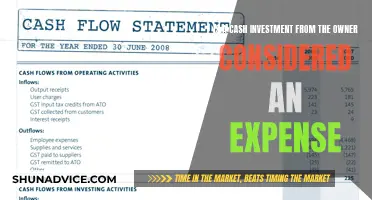
While holding on to cash can be gratifying, it may not be the best option for those looking to grow their wealth. Cash does not increase in value over time and may not keep up with inflation, which refers to the annual increase in the price of goods. For instance, if you put aside $1000 to buy a computer priced at $1000, by the end of the year, the computer may cost $1020 due to inflation, while your savings would have only increased to $1010 with a 1% interest rate. Therefore, holding on to cash in the long term may not be a wise financial decision. Instead, investing your money, even if it is a small amount, can be a better strategy to grow your wealth.
| Characteristics | Values |
|---|---|
| Returns | Cash may not generate meaningful returns |
| Inflation | Cash does not keep up with inflation |
| Emergency savings | Cash can be ideal for short-term or emergency savings |
| Risk | Cash is a safe investment |
What You'll Learn

Cash may not generate meaningful returns
Holding on to your cash may seem like a safe option, but it can be counterproductive. Cash does not increase in value over time and may not generate meaningful returns. While you may make a small amount of interest by keeping your money in a savings account, many investment options have historically outperformed savings account interest rates. Although past performance is not a guarantee of future results, many mutual funds have averaged a better than 5% return over the last 10 years, outperforming the 0 to 2.5% interest you might earn in a traditional savings account.
Cash does not keep up with inflation, which refers to the annual increase in the price of goods. Historically, the cost of everything from groceries to clothing rises between 2% and 3% per year. For example, if you put $1,000 aside in a bank savings account to buy a $1,000 computer next year, you might have about $1,010 in the account at the end of the year, with the bank providing 1% interest. But if inflation rises by 2%, the computer will now cost $1,020, which is $10 more than you saved.
If your money is in cash, it may not keep up with the future cost of living. A better option may be to put your money in a market-based investment where returns can be potentially higher. For example, you could consider a mutual fund or a high-yield savings account, which typically offers higher interest rates than traditional savings accounts.
While investing can be intimidating, you don't need a lot of money to start. The most important thing is to start investing early, even with a small amount of cash, to establish the habit of investing regularly. This will hopefully lead to a large nest egg in the future.
Pension Plans: Cash, Investments, and Your Retirement Future
You may want to see also

Cash does not keep up with inflation
Inflation is a decrease in the purchasing power of money, reflected in a general increase in the prices of goods and services in an economy. In other words, when inflation occurs, your money buys less over time.
Inflation can be calculated as the overall increase in the cost of living or for specific items, such as the cost of gas, groceries, or housing. For example, an item that cost $1.00 in the 1920s would cost about $18.00 today.
When an individual's account doesn't grow at the same rate as inflation, they lose purchasing power. This is especially true for those who save money for specific goals, such as a college fund or a down payment on a home. Their money's purchasing power will decline while saving during inflationary periods.
Cash and cash equivalents receive the biggest blow from inflation. When there is no interest being generated to compete with the rate of inflation, it can quickly eat into the purchasing power of your cash.
To combat this, investors can choose accounts that earn a return higher than the inflation rate, such as money market or high-yield savings accounts.
Understanding Invested Assets: Does Cash Count?
You may want to see also

Focus on index funds
Index funds are a great way to invest your money without needing a lot of cash upfront. They are a form of passive investing, which means they require less active management than other types of investments. This makes them ideal for those who are new to investing or who don't have the time or expertise to actively manage their portfolio.
Here's how they work: index funds are investment funds that follow a benchmark index, such as the S&P 500 or the Nasdaq 100. When you put money into an index fund, your cash is used to invest in all the companies that make up the particular index. This gives you a diverse portfolio without the need to buy individual stocks. For example, investing in an S&P 500 index fund means your investments are tied to the performance of the 500 largest companies in the US.
Index funds are considered a passive investment strategy because they aim to mirror the performance of a specific index. They are passively managed, meaning they are not actively traded, and this has several benefits. Firstly, it keeps costs low. Index funds have lower fees than actively managed funds because they do not require a large staff or frequent trades. Secondly, it simplifies the investment process. With index funds, you don't need to do extensive research or pick individual stocks, making them a good option for those who don't have the time or expertise to actively manage their investments.
Another benefit of index funds is diversification. By investing in an index fund, you automatically gain exposure to a broad range of stocks or bonds, reducing the risk associated with individual stock holdings. This diversification also means you are less likely to suffer big losses if something bad happens to one or two companies in the index.
When choosing an index fund, it's important to consider the fees and performance of the fund. Look for funds with low expense ratios, as these will cost you less in the long run. You should also ensure that the fund aligns with your investment goals and risk tolerance.
In summary, index funds are a great option for those who want to invest without the hassle and risk associated with picking individual stocks. They provide a simple, cost-effective way to gain exposure to a diverse range of investments and are ideal for those who want to take a passive approach to investing.
Temporary Investments: Are They Really Cash?
You may want to see also

Look at fractional shares
Fractional shares are a way to invest in a company without having to buy a full share. They are a great option for those who don't have a lot of cash to invest. With fractional shares, you can buy a piece of a share of stock, rather than the entire share. This makes investing in high-priced stocks more accessible and allows you to diversify your portfolio without a large outlay.
Fractional shares are typically created by participating brokerage firms that offer their clients the ability to buy or sell partial shares. They can also be a result of dividend reinvestment plans, stock splits, and mergers and acquisitions. For example, if a company offers a dividend reinvestment plan, investors can choose to automatically reinvest their cash dividends into additional shares. If the dividend payout is not enough to buy a full share, a fractional share is created.
Fractional shares come with certain benefits. They provide enhanced diversification, making it easier to construct a well-rounded portfolio. They also increase flexibility by making it more accessible to invest in high-priced stocks. Fractional shares allow for precise allocation, enabling you to invest exact dollar amounts and align your investments with your financial goals. They also simplify portfolio rebalancing, making it easier to maintain your desired asset allocations.
Another advantage of fractional shares is efficient use of capital. They minimise idle cash by allowing you to invest smaller amounts that might otherwise remain unused. This helps ensure that your entire portfolio is working towards growth. Fractional shares also enable dollar-cost averaging, making it easier to implement strategies where you invest fixed amounts regularly, smoothing out the impact of market volatility.
Fractional shares also offer the opportunity for custom investment strategies. You can tailor your portfolio to reflect specific themes or sectors of interest, and pursue more personalised investment strategies that align with your unique financial objectives and risk tolerance.
However, there are some limitations to fractional shares. They cannot be bought or sold on the open market; they can only be purchased and sold through participating brokerages. Fractional shares also provide less investment or dividend income than full shares. While you may still receive dividends, your payments will be relative to your holdings. Additionally, not all companies may allow dividend reinvestment plans on fractional shares.
When considering buying fractional shares, it's important to remember that they can only be purchased through specific brokerage firms. Some online platforms offer this service, but the number is still limited. It's also important to note that fractional shares cannot be transferred from one brokerage to another. If you switch brokerages, any fractional shares you own will be liquidated, which may result in capital gains and potential tax implications.
Cash Investment Strategies: Your Guide to Profitable Opportunities
You may want to see also

Evaluate your comfort zone in taking on risk
Before investing, it is important to evaluate your comfort zone in taking on risk. All investments involve some degree of risk, and it is crucial to understand that you could lose some or all of your money. The potential for greater investment returns comes with taking on more risk.
If you have a financial goal with a long time horizon, you are likely to make more money by carefully investing in asset categories with greater risk, like stocks or bonds, rather than restricting your investments to assets with less risk, like cash equivalents. On the other hand, investing solely in cash or cash equivalents may be appropriate for short-term financial goals. The principal concern for individuals investing in cash equivalents is inflation risk, which is the risk that inflation will outpace and erode returns over time.
Cash may not generate meaningful returns as it doesn't increase in value over time on its own. While you may earn a small amount of interest by keeping your money in a savings account, many investment options have historically outperformed savings account-related interest. For example, mutual funds have averaged a better than 5% return over the last 10 years, with some delivering even higher returns, albeit with higher risk.
However, holding cash can be ideal for short-term or emergency savings. If you know you'll need access to your money within a year, keeping it in cash can be a wise decision. Additionally, having easy-to-access emergency savings is important. For instance, if you need to make an unexpected roof repair, it will be faster and more convenient to tap into a savings account.
When evaluating your comfort zone for risk, consider your financial goals, time horizon, and risk tolerance. If you have a long-term goal and a higher risk tolerance, you may be more comfortable investing in riskier assets like stocks or mutual funds. On the other hand, if you have a shorter time horizon and a lower risk tolerance, you may prefer safer investments like savings accounts, certificates of deposit (CDs), or government bonds.
It's important to remember that investing doesn't have to be an all-or-nothing proposition. You can create a well-rounded and diversified portfolio by combining investments with different risk levels and return potentials.
Cash Investments: What Are They?
You may want to see also
Frequently asked questions
Cash does not generate meaningful returns and may not keep up with inflation. While you may make a small amount of interest by holding your money in a savings account, many investment options have historically outperformed savings account interest.
Investing can provide you with another source of income, fund your retirement, or even get you out of a financial jam. It grows your wealth, increases your purchasing power over time, and lets your money work for you.
There are many ways to invest, from safe choices such as CDs and money market accounts to medium-risk options such as corporate bonds, and even higher-risk picks such as stock index funds. Some good investment options for 2024 include high-yield savings accounts, long-term corporate bond funds, dividend stock funds, and S&P 500 index funds.







